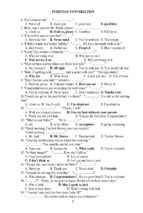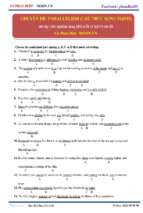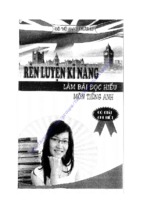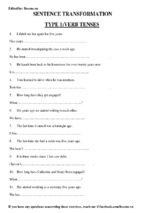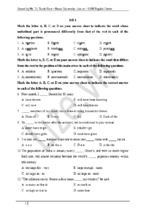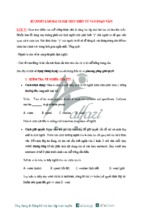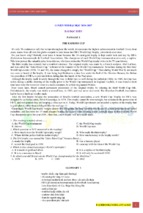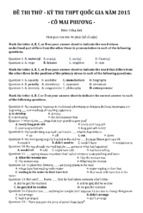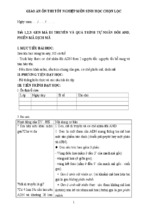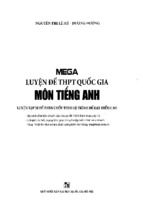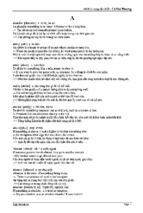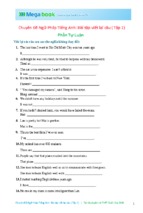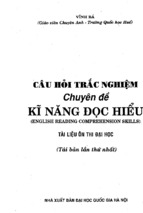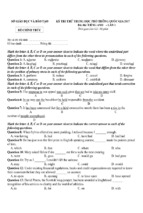ĐỀ THI THỬ SỐ 01
KỲ THI TRUNG HỌC PHỔ THÔNG QUỐC GIA NĂM 2017
Môn thi: TIẾNG ANH - Thời gian làm bài: 60 phút
Họ và tên thí sinh: ……………………....
Ngày sinh: ……………. SBD: ……….
Mark the letter A, B, C or D on your answer sheet to indicate the word whose the underlined part
differs from the other three in pronunciation in each of the following questions.
Question 1: A. cliffs
B. tents
C. blanks
D. gloves
Question 2: A. uniform
B. umbrella
C. understand
D. upward
Mark the letter A, B, C or D on your answer sheet to indicate the word differs from the other three
in the position of primary stress in each of the following questions.
Question 3: A. cultivate
B. property
C. museum
D. tendency
Question 4: A. hotel
B. cassette
C. handful
D. disease
Mark the letter A, B, C or D on your answer sheet to indicate the underpart that needs correction in
each of the following questions.
Question 5: A good essay must both contain enough interesting ideas and specific examples but also
A
B
C
have good organization.
D
Question 6: It’s time you went home, but I’d rather you stay here.
A
B
C
D
Question 7: Thanks to my business trip to Hanoi last month, I was able to attending his wedding.
A
B
C
D
Mark the letter A, B, C or D on your answer sheet to indicate the correct answer to each of the
following questions.
Question 8: If you hadn’t quarelled with the bad boys at school, you _______ a black eye.
A. would have had
B. wouldn’t have had
C. wouldn’t have
D. will have
Question 9: Air pollution together with littering _______ causing many problems in our large industrial
cities today.
A. is
B. are
C. have been
D. was
Question 10: It was not until he took up fishing _______ he began to know more about fish species.
A. which
B. what
C. while
D. that
Question 11: No one is a better cook than his mother, _______?
A. isn’t she
B. are they
C. is she
D. aren’t they
Question 12: It typically takes and one half hours _______ to the top of the Empire State Building.
A. to climb
B. climbing
C. climb
D. climbed
Question 13: I was very excited _______ living on my own but my brother detered me by telling me
difficulties of such a life.
A. for
B. with
C. about
D. in
Question 14: Job seekers find that Internet _______ them with a quick and easy way to find out what is
available.
A. serves
B. provides
C. delivers
D. leads
th
Question 15: The 25 meeting of FAO Committee on Fisheries that took _______ in February 2003 comes at
a critical time in the quest for sustainable fisheries.
A. part
B. place
C. role
D. care
Question 16: Because of the poor harvest, wheat prices have _______ in the last six months.
A. gone up
B. put up
C. jumped up
D. sprung up
Question 17: The medical community continues to _______ progress in the fight against cancer.
A. take
B. do
C. make
D. get
Question 18: Suddenly, it began to rain heavily, so all the summer hikers got _______ all over.
A. tired
B. drenched
C. refreshed
D. cleansed
Question 19: The twentieth century saw a rapid rise in life _______ due to improvements in public health,
nutrition and medicine.
A. expectable
B. expectedly
C. expectation
D. expectancy
Mark the letter A, B, C or D on your answer sheet to indicate the most suitable response to complete
each of the following questions.
Question 20: Tony is talking with Ben about his party.
Tony: “How many people do you want to invite to your birthday party?”
Ben: “ _______.”
A. Do I have to?
B. The more, the merrier
C. Of course, I think so much D. At least 15 kilometers
Question 21: Jenny is paying compliment on his neighbor’s garden.
Jenny: “Love your yard. It’s so beautiful.”
Tom: “_______.”
A. Don’t mention it
B. It’s very unkind of you to say so!
C. Thanks. I’ve planted some flowers
D. Well, it’s new
Mark the letter A, B, C or D on your answer sheet to indicate the word(s) CLOSEST in meaning to
the underlined word(s) in each of the following questions.
Question 22: Lary was so absorbed in his novel that he forgot about his dinner cooking in the oven.
A. engrossed
B. neglected
C. obliged
D. excelled
Question 23: The constraints of being in prison made him hate society even more.
A. restrictions
B. hardships
C. punishments
D. shortages
Mark the letter A, B, C or D on your answer sheet to indicate the word(s) OPPOSITE in meaning to
the underlined word(s) in each of the following questions.
Question 24: My little daughter would spend an inordinate amount of time in the shop, deciding which
goods she was going to buy.
A. excessive
B. limited
C. required
D. abundant
Question 25: Working efficiency has increased exponentially each year, thanks to computers and their
ability to mltiask.
A. constantly
B. at a very fast rate
C. slightly
D. at a very slow rate
Mark the letter A, B, C or D on your answer sheet to indicate the sentence that is CLOSEST in
meaning to each of the following questions.
Question 26: It is such a pity that your sister can’t come as well.
A. If only your sister could come as well.
B. I wish your sister can come as well.
C. But for your sister can come as well.
D. Your sister not coming as well is a pity.
Question 27: According to the report, seventy people were killed in the fire.
A. It is said that seventy people had died in the fire.
B. Seventy people is reported to have been killed in the fire.
C. The death of seventy people is caused by the report.
D. The fire is the reason why seventy people killed.
Question 28: What Rachel does in her free time doesn’t concern me.
A. I don’t know what Rachel does in her free time.
B. What Rachel does in her free time is not my problem.
C. What Rachel does in her free time is not concerned by me.
D. What Rachel does in her free time is none of my business.
Question 29: While I strongly disapprove of your behavior, I will help you this time.
A. I will help you this time because I strongly disapprove of your behavior.
B. Despite my strong disapproval of your behavior, I will help you this time.
C. However strongly you disapprove, I will help you this time.
D. I will help you this time by disapproving your behavior strongly.
Question 30: My sister worries so much about fitness that she wastes a lot of time and money.
A. My sister wastes a lot of time and money though she worries so much about fitness.
B. Fitness worried, my sister wastes a lot of time and money.
C. Worrying so much about fitness, she wastes a lot of time and money.
D. It is about fitness that she wastes a lot of time and money.
Read the following passage and mark the letter A, B, C or D on your answer sheet to indicate the
correct word or phrase that best fits each of the numbered blanks from 31 to 35.
By the time we reach old age, most of us have spent twenty years sleeping. (31) _______ nobody
knows why we do it. Most scientists believe that by resting our bodies, we allow time for essential
maintenance work to be done. Any (32) _____ that there is can be put right more quickly if energy isn’t being
used up doing other things.
Sleeping is controlledby certain chemicals. These build up during the day, eventually reaching levels
that cause tiredness. We can control the effects of these chemicals to some (33) _______. Caffeine helps to
(34) _______ us awake while alcohol and some medicines make us sleepy.
By using electrodes, scientists are able to study what goes on in people’s heads while they sleep.
They have discovered that when we first drop off everything slow down. The heart (35) _____ more slowly,
and our breathing becomes sallow.
Question 31: A. Also
B. Besides
C. Yet
D. Despite
Question 32: A. suffering
B. hurt
C. damage
D. harm
Question 33: A. rate
B. matter
C. amount
D. extent
Question 34: A. stay
B. keep
C. make
D. maintain
Question 35: A. moves
B. trembles
C. hits
D. beats
Read the following passage and mark the letter A, B, C or D on your answer sheet to indicate the
correct answer to each of the questions from 36 to 40.
Robert Capa
Robert Capa is a name that has for many years been synonymous with war photography.
Born in Hungary in 1913 as Friedmann Endre Ernő, Capa was forced to leave his native country
after his involvement in anti government protests. Capa had originally wanted to become a writer, but
after his arrival in Berlin had first found work as a photographer. He later left Germany and moved to
France due to the rise in Nazism. He tried to find work as a freelance journalist and it was here that he
changed his name to Robert Capa, mainly because he thought it would sound more American.
In 1936, after the breakout of the Spanish Civil war, Capa went to Spain and it was here over the
next three years that he built his reputation as a war photographer. It was here too in 1936 that he took
one of his most famous pictures, The Death of a Loyalist Soldier. One of Capa’s most famous quotes was 'If
your pictures aren't good enough, you're not close enough.' And he took his attitude of getting close to the
action to an extreme. His photograph, The Death of a Loyalist Soldier is a prime example of this as Capa
captures the very moment the soldier falls. However, many have questioned the authenticity of this
photograph, claiming that it was staged.
When World war II broke out, Capa was in New York, but he was soon back in Europe covering the
war for Life magazine. Some of his most famous work was created on 6th June 1944 when he swam ashore
with the first assault on Omaha Beach in the D-Day invasion of Normandy. Capa, armed only with two
cameras, took more than one hundred photographs in the first hour of the landing, but a mistake in the
darkroom during the drying of the film destroyed all but eight frames. It was the images from these frames
however that inspired the visual style of Steven Spielberg's Oscar winning movie ‘Saving Private Ryan’.
When Life magazine published the photographs, they claimed that they were slightly out of focus, and
Capa later used this as the title of his autobiographical account of the war.
Question 36: Robert Capa decided to move to France because of _______.
A. his involvement in anti government protests
B. the increase in Nazism
C. building his reputation
D. taking photographs
Question 37:The word “originally” in the passage is closest in meaning to _______.
A. familiarly
B. eventually
C. initially
D. subsequently
Question 38: Why did he change his name?
A. To hide his identity
B. To leave Hungary
C. To be involved in protests D. To sound more American
Question 39: Capa’s famous picture “The Death of a Loyalist Soldier” _______.
A. was taken by someone else
B. was definitely genuine
C. wasn’t even taken in Spain
D. cannot be proven genuine or staged
Question 40: Which sentence best paraphrases the last paragraph?
A. Capa never tried to avoid danger. He risked his life to take photographs of the D-Day invasion, but
then destroyed most of them.
B. Capa took some of his most famous photographs during the D-Day invasion, but most were
tragically destroyed in an accident.
C. Capa only kept the best eight D-Day photographs as the others were out of focus. These inspired the
visual style of a Hollywood film.
D. Capa left Europe when the war broke out and went to take his most famous photographs of the DDay invasion.
Read the following passage and mark the letter A, B, C or D on your answer sheet to indicate the
correct answer to each of the questions from 41 to 50.
As heart disease continues to be the number-one killer in the United States, researchers have become
increasingly interested in identifying the potential risk factors that trigger heart attacks. High-fat diets
and "life in the fast lane" have long been known to contribute to the high incidence of heart failure. But
according to new studies, the list of risk factors may be significantly longer and quite surprising.
Heart failure, for example, appears to have seasonal and temporal patterns. A higher percentage of
heart attacks occur in cold weather, and more people experience heart failure on Monday than on any
other day of the week. In addition, people are more susceptible to heart attacks in the first few hours
after waking. Cardiologists first observed this morning phenomenon in the mid-1980, and have since
discovered a number of possible causes. An early-morning rise in blood pressure, heart rate, and
concentration of heart stimulating hormones, plus a reduction of blood flow to the heart, may all
contribute to the higher incidence of heart attacks between the hours of 8:00 A.M. and 10:00 A.M.
In other studies, both birthdays and bachelorhood have been implicated as risk factors. Statistics
reveal that heart attack rates increase significantly for both females and males in the few days
immediately preceding and following their birthdays. And unmarried men are more 25 at risk for heart
attacks than their married counterparts. Though stress is thought to be linked in some way to all of the
aforementioned risk factors, intense research continues in the hope of further comprehending why and
how heart failure is triggered.
Question 41: What does the passage mainly discuss?
A. risk factors in heart attacks
B. seasonal and temporal patterns in heart attacks
C. cardiology in the 1980s
D. diet and stress as factors in heart attacks
Question 42: In line 3, the word "potential" could best be re-placed by which of the following?
A. harmful
B. unknown
C. primary
D. possible
Question 43: The word "trigger" as used in line 3 is closest in meaning to which of the following?
A. involve
B. cause
C. affect
D. encounter
Question 44: Which of the following could best replace the word "incidence" as used in line 5?
A. increase
B. rate
C. chance
D. factor
Question 45: The author uses the word "temporal" in line 9 to mean _______.
A. affected by
B. of a certain date
C. regularly
D. expected
Question 46: The phrase "susceptible to" in line 12 could best be replaced by _______.
A. aware of
B. accustomed
C. affected by
D. prone to
Question 47: According to the passage, which of the following is NOT a possible cause of many heart
attacks?
A. decreased blood flow to the heart
B. increased blood pressure
C. lower heart rate
D. increase in hormones
Question 48: The word "phenomenon" in line 14 refers to which of the following?
A. habit
B. illness
C. occurence
D. activity
Question 49: Which of the following is NOT cited as a possible risk factor?
A. having a birthday
B. getting married
C. eating fatty foods
D. being under stress
Question 50: Which of the following does the passage infer?
A. We now fully understand how risk factors trigger heart attacks.
B. We recently began to study how risk factors trigger heart attacks.
C. We have not identified many risk factors associated with heart attacks.
D. We do not fully understand how risk factors trigger heart attacks.
______________________THE END _______________________
ĐÁP ÁN ĐỀ THI THỬ SỐ 01
KỲ THI TRUNG HỌC PHỔ THÔNG QUỐC GIA NĂM 2017
Môn thi: TIẾNG ANH - Thời gian làm bài: 60 phút
Họ và tên thí sinh: ……………………....
Ngày sinh: ……………. SBD: ……….
Mark the letter A, B, C or D on your answer sheet to indicate the word whose the underlined part
differs from the other three in pronunciation in each of the following questions.
Question 1: A. cliffs
B. tents
C. blanks
D. gloves
Question 2: A. uniform
B. umbrella
C. understand
D. upward
Mark the letter A, B, C or D on your answer sheet to indicate the word differs from the other three
in the position of primary stress in each of the following questions.
Question 3: A. cultivate
B. property
C. museum
D. tendency
Question 4: A. hotel
B. cassette
C. handful
D. disease
Mark the letter A, B, C or D on your answer sheet to indicate the underpart that needs correction in
each of the following questions.
Question 5: A good essay must both contain enough interesting ideas and specific examples but also
A
B
C
have good organization.
D
Question 6: It’s time you went home, but I’d rather you stay here.
A
B
C
D
Question 7: Thanks to my business trip to Hanoi last month, I was able to attending his wedding.
A
B
C
D
Mark the letter A, B, C or D on your answer sheet to indicate the correct answer to each of the
following questions.
Question 8: If you hadn’t quarelled with the bad boys at school, you _______ a black eye.
A. would have had
B. wouldn’t have had C. wouldn’t have
D. will have
Question 9: Air pollution together with littering _______ causing many problems in our large industrial
cities today.
A. is
B. are
C. have been
D. was
Question 10: It was not until he took up fishing _______ he began to know more about fish species.
A. which
B. what
C. while
D. that
Question 11: No one is a better cook than his mother, _______?
A. isn’t she
B. are they
C. is she
D. aren’t they
Question 12: It typically takes and one half hours _______ to the top of the Empire State Building.
A. to climb
B. climbing
C. climb
D. climbed
Question 13: I was very excited _______ living on my own but my brother detered me by telling me
difficulties of such a life.
A. for
B. with
C. about
D. in
Question 14: Job seekers find that Internet _______ them with a quick and easy way to find out what is
available.
A. serves
B. provides
C. delivers
D. leads
th
Question 15: The 25 meeting of FAO Committee on Fisheries that took _______ in February 2003 comes at
a critical time in the quest for sustainable fisheries.
A. part
B. place
C. role
D. care
Question 16: Because of the poor harvest, wheat prices have _______ in the last six months.
A. gone up
B. put up
C. jumped up
D. sprung up
Question 17: The medical community continues to _______ progress in the fight against cancer.
A. take
B. do
C. make
D. get
Question 18: Suddenly, it began to rain heavily, so all the summer hikers got _______ all over.
A. tired
B. drenched
C. refreshed
D. cleansed
Question 19: The twentieth century saw a rapid rise in life _______ due to improvements in public health,
nutrition and medicine.
A. expectable
B. expectedly
C. expectation
D. expectancy
Mark the letter A, B, C or D on your answer sheet to indicate the most suitable response to complete
each of the following questions.
Question 20: Tony is talking with Ben about his party.
Tony: “How many people do you want to invite to your birthday party?”
Ben: “ _______.”
A. Do I have to?
B. The more, the merrier
C. Of course, I think so much D. At least 15 kilometers
Question 21: Jenny is paying compliment on his neighbor’s garden.
Jenny: “Love your yard. It’s so beautiful.”
Tom: “_______.”
A. Don’t mention it
B. It’s very unkind of you to say so!
C. Thanks. I’ve planted some flowers
D. Well, it’s new
Mark the letter A, B, C or D on your answer sheet to indicate the word(s) CLOSEST in meaning to
the underlined word(s) in each of the following questions.
Question 22: Lary was so absorbed in his novel that he forgot about his dinner cooking in the oven.
A. engrossed
B. neglected
C. obliged
D. excelled
Question 23: The constraints of being in prison made him hate society even more.
A. restrictions
B. hardships
C. punishments
D. shortages
Mark the letter A, B, C or D on your answer sheet to indicate the word(s) OPPOSITE in meaning to
the underlined word(s) in each of the following questions.
Question 24: My little daughter would spend an inordinate amount of time in the shop, deciding which
goods she was going to buy.
A. excessive
B. limited
C. required
D. abundant
Question 25: Working efficiency has increased exponentially each year, thanks to computers and their
ability to mltiask.
A. constantly
B. at a very fast rate
C. slightly
D. at a very slow rate
Mark the letter A, B, C or D on your answer sheet to indicate the sentence that is CLOSEST in
meaning to each of the following questions.
Question 26: It is such a pity that your sister can’t come as well.
A. If only your sister could come as well.
B. I wish your sister can come as well.
C. But for your sister can come as well.
D. Your sister not coming as well is a pity.
Question 27: According to the report, seventy people were killed in the fire.
A. It is said that seventy people had died in the fire.
B. Seventy people are reported to have been killed in the fire.
C. The death of seventy people is caused by the report.
D. The fire is the reason why seventy people killed.
Question 28: What Rachel does in her free time doesn’t concern me.
A. I don’t know what Rachel does in her free time.
B. What Rachel does in her free time is not my problem.
C. What Rachel does in her free time is not concerned by me.
D. What Rachel does in her free time is none of my business.
Question 29: While I strongly disapprove of your behavior, I will help you this time.
A. I will help you this time because I strongly disapprove of your behavior.
B. Despite my strong disapproval of your behavior, I will help you this time.
C. However strongly you disapprove, I will help you this time.
D. I will help you this time by disapproving your behavior strongly.
Question 30: My sister worries so much about fitness that she wastes a lot of time and money.
A. My sister wastes a lot of time and money though she worries so much about fitness.
B. Fitness worried, my sister wastes a lot of time and money.
C. Worrying so much about fitness, she wastes a lot of time and money.
D. It is about fitness that she wastes a lot of time and money.
Read the following passage and mark the letter A, B, C or D on your answer sheet to indicate the
correct word or phrase that best fits each of the numbered blanks from 31 to 35.
By the time we reach old age, most of us have spent twenty years sleeping. (31) _______ nobody
knows why we do it. Most scientists believe that by resting our bodies, we allow time for essential
maintenance work to be done. Any (32) _____ that there is can be put right more quickly if energy isn’t being
used up doing other things.
Sleeping is controlledby certain chemicals. These build up during the day, eventually reaching levels
that cause tiredness. We can control the effects of these chemicals to some (33) _______. Caffeine helps to
(34) _______ us awake while alcohol and some medicines make us sleepy.
By using electrodes, scientists are able to study what goes on in people’s heads while they sleep.
They have discovered that when we first drop off everything slow down. The heart (35) _____ more slowly,
and our breathing becomes sallow.
Question 31: A. Also
B. Besides
C. Yet
D. Despite
Question 32: A. suffering
B. hurt
C. damage
D. harm
Question 33: A. rate
B. matter
C. amount
D. extent
Question 34: A. stay
B. keep
C. make
D. maintain
Question 35: A. moves
B. trembles
C. hits
D. beats
Read the following passage and mark the letter A, B, C or D on your answer sheet to indicate the
correct answer to each of the questions from 36 to 40.
Robert Capa
Robert Capa is a name that has for many years been synonymous with war photography.
Born in Hungary in 1913 as Friedmann Endre Ernő, Capa was forced to leave his native country
after his involvement in anti government protests. Capa had originally wanted to become a writer, but
after his arrival in Berlin had first found work as a photographer. He later left Germany and moved to
France due to the rise in Nazism. He tried to find work as a freelance journalist and it was here that he
changed his name to Robert Capa, mainly because he thought it would sound more American.
In 1936, after the breakout of the Spanish Civil war, Capa went to Spain and it was here over the
next three years that he built his reputation as a war photographer. It was here too in 1936 that he took
one of his most famous pictures, The Death of a Loyalist Soldier. One of Capa’s most famous quotes was 'If
your pictures aren't good enough, you're not close enough.' And he took his attitude of getting close to the
action to an extreme. His photograph, The Death of a Loyalist Soldier is a prime example of this as Capa
captures the very moment the soldier falls. However, many have questioned the authenticity of this
photograph, claiming that it was staged.
When World war II broke out, Capa was in New York, but he was soon back in Europe covering the
war for Life magazine. Some of his most famous work was created on 6th June 1944 when he swam ashore
with the first assault on Omaha Beach in the D-Day invasion of Normandy. Capa, armed only with two
cameras, took more than one hundred photographs in the first hour of the landing, but a mistake in the
darkroom during the drying of the film destroyed all but eight frames. It was the images from these frames
however that inspired the visual style of Steven Spielberg's Oscar winning movie ‘Saving Private Ryan’.
When Life magazine published the photographs, they claimed that they were slightly out of focus, and
Capa later used this as the title of his autobiographical account of the war.
Question 36: Robert Capa decided to move to France because of _______.
A. his involvement in anti government protests
B. the increase in Nazism
C. building his reputation
D. taking photographs
Question 37:The word “originally” in the passage is closest in meaning to _______.
A. familiarly
B. eventually
C. initially
D. subsequently
Question 38: Why did he change his name?
A. To hide his identity
B. To leave Hungary
C. To be involved in protests D. To sound more American
Question 39: Capa’s famous picture “The Death of a Loyalist Soldier” _______.
A. was taken by someone else
B. was definitely genuine
C. wasn’t even taken in Spain
D. cannot be proven genuine or staged
Question 40: Which sentence best paraphrases the last paragraph?
A. Capa never tried to avoid danger. He risked his life to take photographs of the D-Day invasion, but
then destroyed most of them.
B. Capa took some of his most famous photographs during the D-Day invasion, but most
were tragically destroyed in an accident.
C. Capa only kept the best eight D-Day photographs as the others were out of focus. These inspired the
visual style of a Hollywood film.
D. Capa left Europe when the war broke out and went to take his most famous photographs of the DDay invasion.
Read the following passage and mark the letter A, B, C or D on your answer sheet to indicate the
correct answer to each of the questions from 41 to 50.
As heart disease continues to be the number-one killer in the United States, researchers have become
increasingly interested in identifying the potential risk factors that trigger heart attacks. High-fat diets
and "life in the fast lane" have long been known to contribute to the high incidence of heart failure. But
according to new studies, the list of risk factors may be significantly longer and quite surprising.
Heart failure, for example, appears to have seasonal and temporal patterns. A higher percentage of
heart attacks occur in cold weather, and more people experience heart failure on Monday than on any
other day of the week. In addition, people are more susceptible to heart attacks in the first few hours
after waking. Cardiologists first observed this morning phenomenon in the mid-1980, and have since
discovered a number of possible causes. An early-morning rise in blood pressure, heart rate, and
concentration of heart stimulating hormones, plus a reduction of blood flow to the heart, may all
contribute to the higher incidence of heart attacks between the hours of 8:00 A.M. and 10:00 A.M.
In other studies, both birthdays and bachelorhood have been implicated as risk factors. Statistics
reveal that heart attack rates increase significantly for both females and males in the few days
immediately preceding and following their birthdays. And unmarried men are more 25 at risk for heart
attacks than their married counterparts. Though stress is thought to be linked in some way to all of the
aforementioned risk factors, intense research continues in the hope of further comprehending why and
how heart failure is triggered.
Question 41: What does the passage mainly discuss?
A. risk factors in heart attacks
B. seasonal and temporal patterns in heart attacks
C. cardiology in the 1980s
D. diet and stress as factors in heart attacks
Question 42: In line 3, the word "potential" could best be re-placed by which of the following?
A. harmful
B. unknown
C. primary
D. possible
Question 43: The word "trigger" as used in line 3 is closest in meaning to which of the following?
A. involve
B. cause
C. affect
D. encounter
Question 44: Which of the following could best replace the word "incidence" as used in line 5?
A. increase
B. rate
C. chance
D. factor
Question 45: The author uses the word "temporal" in line 9 to mean _______.
A. affected by
B. of a certain date
C. regularly
D. expected
Question 46: The phrase "susceptible to" in line 12 could best be replaced by _______.
A. aware of
B. accustomed
C. affected by
D. prone to
Question 47: According to the passage, which of the following is NOT a possible cause of many heart
attacks?
A. decreased blood flow to the heart
B. increased blood pressure
C. lower heart rate
D. increase in hormones
Question 48: The word "phenomenon" in line 14 refers to which of the following?
A. habit
B. illness
C. occurence
D. activity
Question 49: Which of the following is NOT cited as a possible risk factor?
A. having a birthday
B. getting married
C. eating fatty foods
D. being under stress
Question 50: Which of the following does the passage infer?
A. We now fully understand how risk factors trigger heart attacks.
B. We recently began to study how risk factors trigger heart attacks.
C. We have not identified many risk factors associated with heart attacks.
D. We do not fully understand how risk factors trigger heart attacks.
______________________THE END _______________________
- Xem thêm -

